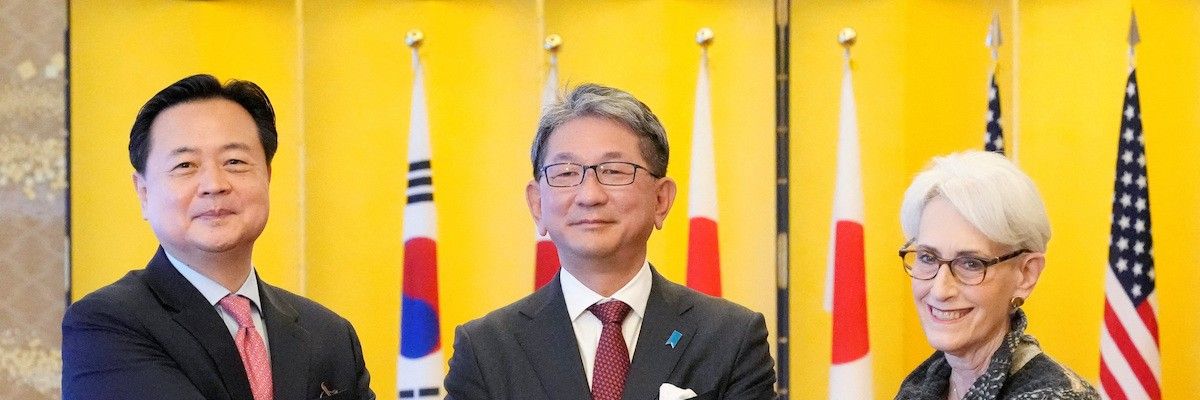At the recent UN General Assembly First Committee session on October 19, China’s ambassador for disarmament affairs, Li Song, declared that “China has solemnly committed to no first use of nuclear weapons at any time and under any circumstances, and not using or threatening to use nuclear weapons against non-nuclear-weapon states or nuclear-weapon-free zones unconditionally.”
Just one week later, another superpower failed to make the same promise. And it wasn’t Russia.
On October 25, at U.S.-sponsored talks with Japan and South Korea, Deputy Secretary of State Wendy Sherman announced that the U.S. commitment to defending Japan and South Korea is “ironclad.” She then explained what that meant, stating that “we will use the full range of U.S. defense capabilities to defend our allies, including nuclear, conventional and missile defense capabilities.”
Her statement would seem to match or even exceed Russia’s recent provocative proclamations. Putin has said that "in the event of a threat to the territorial integrity of our country and to defend Russia and our people, we will certainly make use of all weapon systems available to us." Putin never specifies nuclear weapons, though his remarks have been largely interpreted as such.
Presumably, those weapons could be used to “defend” territories in Ukraine now considered part of the Russian federation, including Crimea, Donbas, Kherson, and Zaporizhzhia.
The U.S. statement goes beyond that. The State Department announcement states that its nuclear retaliation policy would be triggered not only by an attack on the U.S. but also by an attack on U.S. allies. And this is not an aberration. Sherman was not going rogue or speaking irresponsibly. The 2018 U.S. Nuclear Posture Review states that "the United States would only consider the employment of nuclear weapons in extreme circumstances to defend the vital interests of the United States, its allies, and partners. Extreme circumstances could include significant non-nuclear strategic attacks." (Editor's note: Biden's new 2022 Nuclear Posture Review announced Thursday afternoon reaffirms this statement entirely.)
The U.S. also insists that it "has never adopted a 'no first use' policy." Washington, then, seems to have the most permissive nuclear first strike policy in the world today, given that its use of nuclear weapons extends to the defense of "allies and partners" and not just self-defense.
This is not the first time the U.S. has threatened North Korea with its ultimate firepower. In his 2017 UN address, Trump insisted that "the United States has great strength and patience, but if it is forced to defend itself or its allies, we will have no choice but to totally destroy North Korea." A month earlier, Trump threatened that if North Korea made “any more threats to the United States. . . . they will be met with fire and fury like the world has never seen.”
On July 9, 1950, at the start of the Korean War, the Joint Chiefs of Staff debated “whether or not A-bombs should be made available to MacArthur." Gen. Douglas MacArthur had said that he “see[s] here a unique use for the atomic bomb.” He would later say that he “would have dropped 30 or so atomic bombs.” On December 9, MacArthur requested commander’s discretion to use atomic bombs, and he submitted a list of potential targets.
President Truman, the only world leader to have ordered the use of atomic bombs, made the threat public in a November 1950 press conference, when he warned that the U.S. might use any weapon in its arsenal. While Truman was speaking, Air Force General George Stratemeyer put the Strategic Air Command on warning to be prepared to dispatch bombers with nuclear capabilities.
In his book The Doomsday Machine: Confessions of a Nuclear War Planner, Daniel Ellsberg says that “when Eisenhower arrived in the White House, the Korean War was stalemated. Eisenhower ended the impasse in a hurry. He secretly got word to the Chinese that he would drop nuclear bombs on North Korea unless a truce was signed immediately.” When Eisenhower was asked how the Korean War had ended, Ellsberg adds, he answered that it was due to the “danger of an atomic war.”
Ellsberg also reports that, in 1995, the Clinton administration secretly threatened North Korea that it could use nuclear weapons against North Korea’s nuclear reactor program.
It is because of this history, North Korea insists, that they have acquired a nuclear weapons program as a deterrent to U.S. threats. Kim Jong-un has said that "unless the U.S. hostile policy toward the DPRK and the nuclear threat are fundamentally resolved, we will not put nuclear and ballistic rockets on the negotiating table under any circumstances."
North Korea’s recent legislation declaring itself a nuclear weapons state declares that it will "never give up" its nuclear weapons. In his speech marking the passage of the nuclear state legislation, Kim Jong-un said that "as long as nuclear weapons exist on Earth, and imperialism and the anti-North Korean maneuvers of the U.S. and its followers remain, our road to strengthening our nuclear force will never end."
On December 9, 1981, the UN passed the Declaration on the Prevention of Nuclear Catastrophe. It reaffirms that “the universally accepted objective is to eliminate completely the possibility of the use of nuclear weapons.” It then pledges to “solemnly proclaim” that “any doctrines allowing the first use of nuclear weapons . . . are incompatible with human moral standards and the lofty ideals of the United Nations.”
As the world recklessly navigates its way through the most dangerous nuclear threat in decades, it is time to take seriously superpower boasts that they respect international law and the international order. Respecting international law includes respecting the declaration that first use nuclear policies, like those recently articulated by the U.S. and Russia, “are incompatible with . . . the lofty ideals of the United Nations.”















